Beyond the Point of No Return: We’re Losing the Battle
Not only it’s “not just a flu,” but we’re going to lose the battle: instead of taking stronger measures than China, we’re babbling here in the “civilized” West. It’s not just Italy, and Spain, and Germany, and France; I can’t even imagine what’s going to be like when the US reaches the top of the curve. Mad Max-like movies are unrealistic; now we’re going to experience the real thing. But meanwhile, instead of energetic action, we’re like a rabbit in the headlights.

Yes, the virus originated in China–but it shouldn’t have surprised anyone, as several studies from the past (2007 to 2019) warned that viruses like the bird flu, the swine flu and SARS are highly likely to appear in China and spread around the world (globalization oblige–for those less educated, it’s a semicit. of noblesse oblige). Yes, China has a huge responsibility, as the government, after trying to deny there’s anything wrong, only instituted a lockdown in Wuhan on January 23–seven weeks after the virus first appeared. All this can’t hide the stunning lack of leadership of the decadent West. And now, hiding behind “The Italian Patient” doesn’t help: it doesn’t help to blame China for what happens outside China, and it can’t help blaming the lack of discipline of the Italians for the lack of action of an entire Europe.
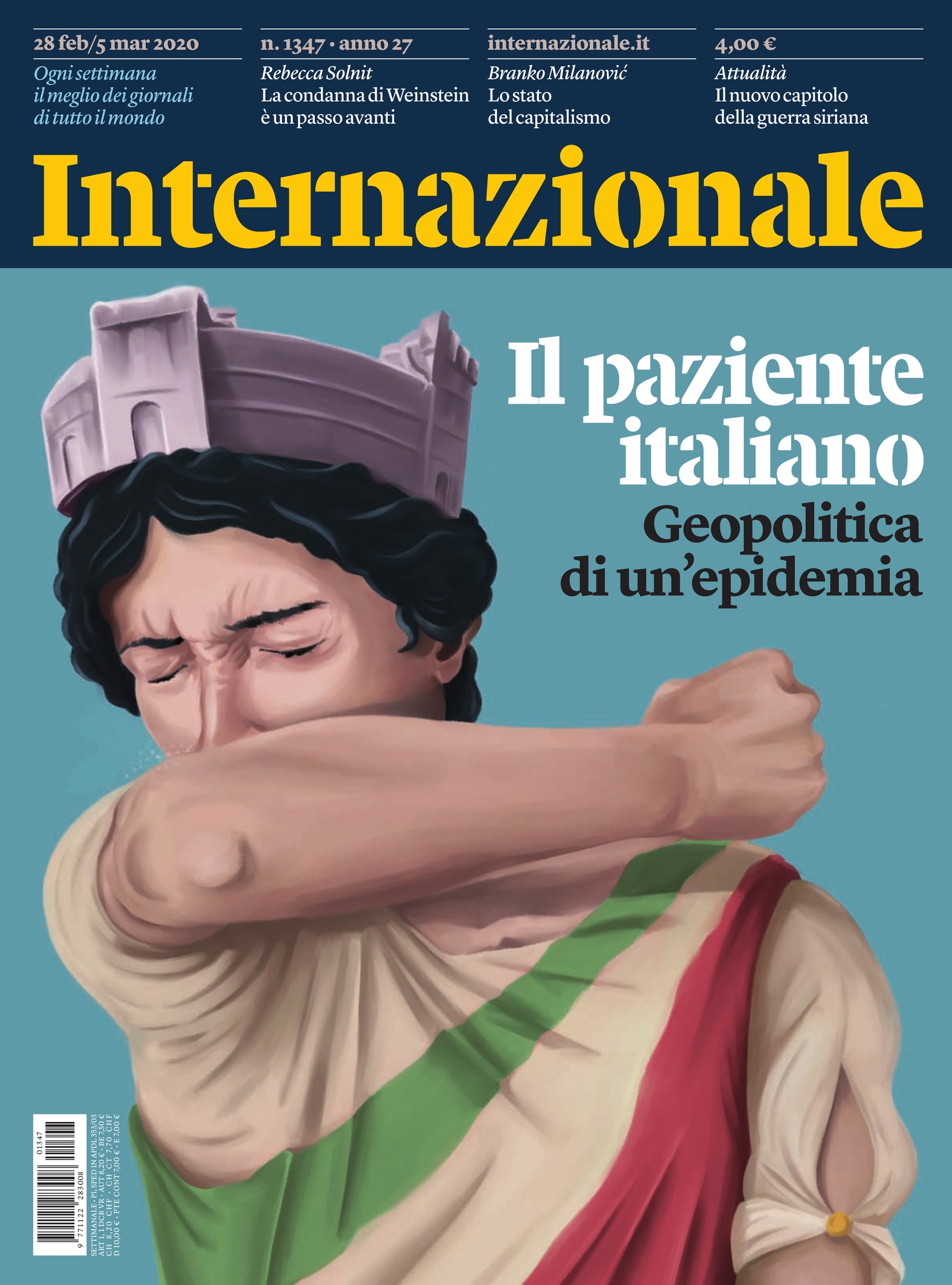
It did help to ban the flights–but it happened too late, and the ban wasn’t total. Taiwan, South Korea, Singapore and Vietnam were faster to react, with remarkable results–which is especially unexpected from Vietnam, a one-party state, yet able to put the life of the people first and foremost, and to learn from China’s lack of transparency.
It didn’t help that the borders weren’t fully closed right away. The incompetent Ursula von der Leyen finally admitted she “underestimated” the virus when she insisted that “free movement is essential” to the “values” of the Union. French President Macron and German Chancellor Merkel were equally stupid in their attempts to downplay the situation and to insist for as much freedom of traveling as possible.
But most of all, it didn’t help that the lockdowns, curfews, heavy-handed containment measures, total quarantines–initially in Lombardy, then the entire Italy, later in France, Spain, Belgium, and hopefully soon in Germany–happened too late, and the lockdowns aren’t so strict as they were in Wuhan. Starting with voluntary confinement for those suspected, and “recommending” people to increase their “social distance” was too weak a measure. It specifically doesn’t help when you politely “appeal” to your fellow citizens to observe the rules instead of saying “I order you to do this and that”–and that’s one of the mistakes Angela Merkel made.

This political class is totally out of touch with the reality. They–and by “they” I mean the so-called “leaders”–acted as if their major concern were to preserve the economic growth, the GDP, to keep the big corporations happy, so they could be bribed to the necessary extent as to win the next elections. The death of their subjects couldn’t have bothered them too much.
If China–whose commitment to become the number one world economy can’t be doubted–decided to really lock up in their residential complexes, neighborhoods, villages and towns everyone in Hubei, with the price of a decrease in the GDP, how could anyone in the West believe the situation is less than very severe? Heck, those idiots in Germany and France stubbornly refused to close the schools and kindergartens until the very last minute! (In Baden-Württemberg they decided on a Friday that schools are closing… the next Tuesday, not on Monday! And in France they insisted on keeping the first round of the municipal elections, unnecessarily favoring the spread of the infection; the second round was postponed, so in the places when it’s necessary, the first round proved useless. Politicians and their negative IQ…)
But idiots are not in short supply!
Working from home, télétravail, telelavoro, Homeoffice (in Denglish) doesn’t seem smart enough. So many jobs that are compatible with working from home (because they involve a computer, Internet access and nothing more) are Bullshit Jobs, which also means they’re not essential to the society, and sometimes they only artificially increase the GDP. The only essential activities are the productive ones; beyond the missing face masks (mostly Made in China), the missing hand sanitizers, and the insufficient number of medical ventilators, what people really need right now is what they always needed: food, clothing, health care, and (obviously) electricity & communications. (Culture too, and I don’t mean Netflix, but bookstores and newsstands, which are still open even where restrictions of movement are in place.)

By refusing to close down the factories–except for those able to temporarily reconvert to manufacturing of protective face masks, medical ventilators, and sanitizers–Governments were greedier than the Chinese communist-fascist regime, and they’ll probably be responsible not only for hundreds of thousands of deaths, but also for “a global recession – perhaps of record dimensions,” which is exactly what they believed they were just avoiding!
“Flattening the curve” is a delusion too, because it suggests that taking “some measures” is enough to make the situation “manageable” without severe lockdown measures. Unfortunately, a generic curve cannot stand for the exact capacity in ICUs nor for the age structure of a specific country, therefore this illusion will prove deadly. The epidemiologists who cried out loud “Lockdown NOW!” weren’t heard, and Governments based their decision on economic criteria only.
In Germany, even the eminent virologist Christian Drosten (from Charité Berlin), in contrast to the virologist Alexander Kekulé (head of the Institute of Medical Microbiology in Halle (Saale)), persuaded Angela Merkel to embrace the cynical “herd immunity” model: let 40-70% of the population get contaminated, because in the end the mass-developed immunity will stop the pandemic. As for the dead, being them 1% or 5% (even 8% in countries where one third of the population is 65+), they’re only a statistic, not human beings… As for Boris Johnson, he was pushed into a similarly irresponsible approach by Sir Patrick Vallance (government’s chief scientific adviser) who said on TV as recently as on March 13 that about 60% of people will need to become infected with coronavirus in order for the UK to enjoy “herd immunity.”
This is murder in the first degree. At a second thought, I’d rather say it’s genocide.
With Germany being–in terms of the spreading curve–only 8 days behind Italy, the humanitarian catastrophe cannot be avoided. I can only hope that nobody will ever reelect such politicians.

The WHO also had its flaws. The recent call of WHO’s chief–“Test, test, test!”–came too late, and it’s only the last in a long chain of errors. On Jan. 31, Tedros said that widespread travel bans and restrictions were not needed to stop the outbreak and could “have the effect of increasing fear and stigma, with little public health benefit.” Later, the WHO–but also a number of “specialists”–said that face masks were not effective, particularly the simple surgical ones, and Governments were only happy to hide behind such an assertion their criminal incapacity to provide the medical staff and the public with such a scarce but essential item. And this backfired. In fact, no matter how partial their effectiveness, masks are more necessary than ever to protect spreading the virus not only through the saliva aerosols and droplets expelled through sneezing and coughing, but also those generated during speaking–something called postillons in French.

Doctors (even this guy) and the WHO also initially declared the sanitary alcohol as being ineffective, despite being known (and the CDC always maintained it) that from a concentration of 60% v/v (120-proof), alcohol is indeed effective, and in some countries 70% v/v alcohol is routinely used by the public as a sanitary disinfectant.
On March 14, the French Health Minister warned about a possible aggravating effect of the ibuprofen (or other anti-inflammatory drugs) on the infections with COVID-19. While not substantiated by any study, and only suggested by some clinical observations, as a precautionary principle one should avoid it and prefer the acetaminophen to fight the fever. (Let’s ignore the related fake news, but nonetheless mention that an April 2019 communiqué of the French national drug safety agency suggested that anti-inflammatory drugs favor the aggravation of infections with Streptococcus and Pneumococcus, so nothing is impossible; we should admit that what we don’t know about SARS-CoV-2 is more than what we know.) OK, so for a couple of days the WHO said “let’s avoid ibuprofen in such cases for the time being,” only to retract the advisory on March 18:
Sheer arrogance.
Last but not least, WHO’s procedures for epidemics are terribly dumb, and nations and provinces weren’t any smarter. Banning public gatherings larger than 1,000 or 500 or 200 or 100 persons (depending on the “WHO pandemic phase“) is something that only a bureaucrat could have thought of! Once you acknowledge it’s happening, the only measure is a total lockdown, the way the Chinese finally managed to do, with good results, even if we’re not to trust everything they say!
But some people believe that any such restrictions are “fundamentally evil.” So it’s better to only slow down a little the spreading speed of a virus, and let people die “in the full exercise of their democratic rights.”
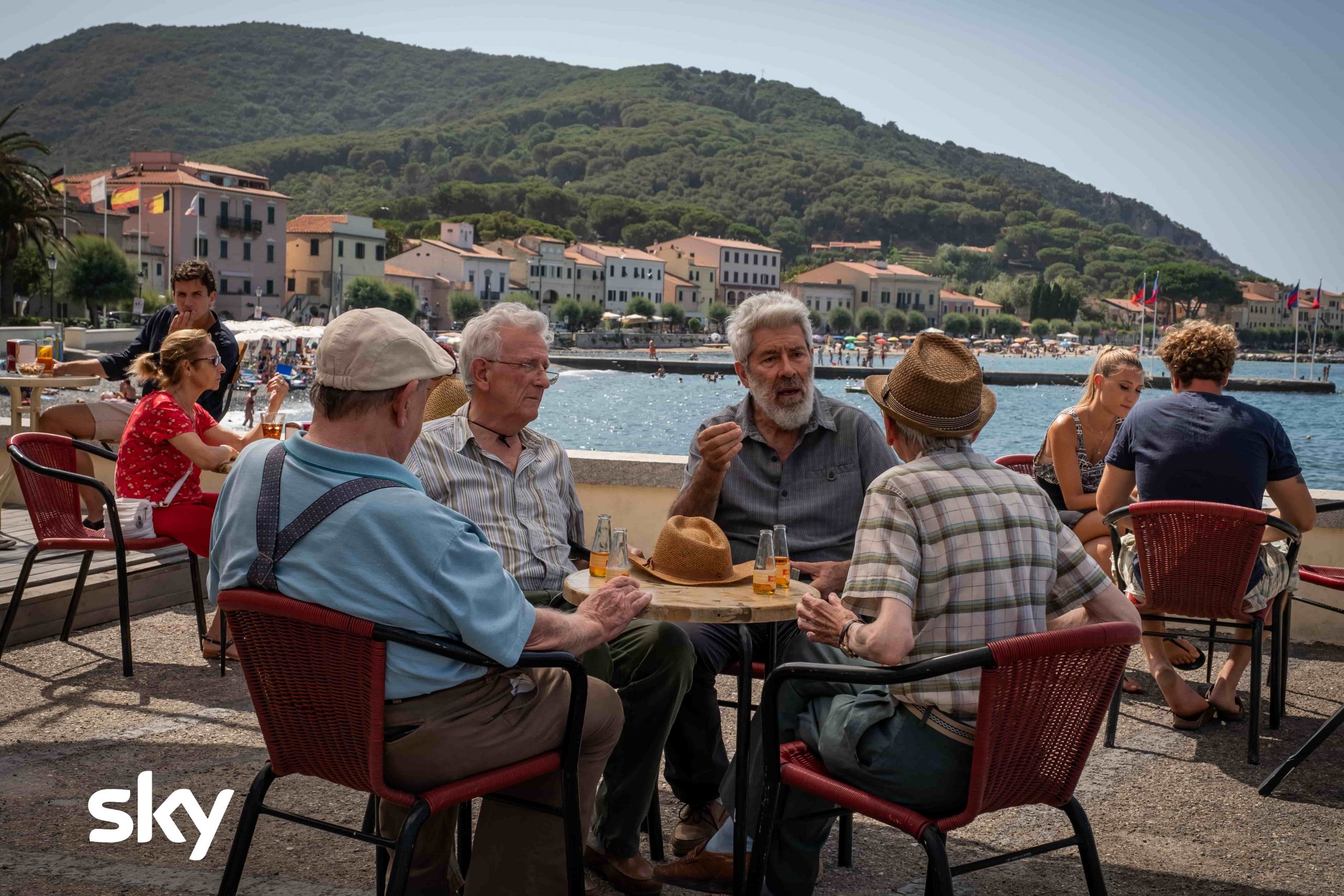
Italians were blamed for their structural lack of discipline, combined with their very warm, very rich social life that made them defy first the official recommendations, and then the lockdown. Judging by how the virus has spread in other countries, and also by how the youth serenely seemed not to give a damn, I wouldn’t put the stigma on the anziani. The general responsibility is with the Government, the only one able to declare national emergency and to use all the resources–including the army–to enforce any special measures that are deemed necessary.
Italy, Spain, France, Germany, and pretty much everywhere else: nobody can find hand sanitizers, surface sanitizers (such as bleach), protective gloves and face masks. Of course such a situation couldn’t have been predicted (or could it?), but please name a country where shopping carts, bus railings, door handles and similar items are regularly disinfected. (Don’t answer: “China, today.”) A culture of hygiene doesn’t exist even in those countries who “don’t eat bats and pangolins.” So the pandemic will go on everywhere.
The lockdown helped Italy to some extent…
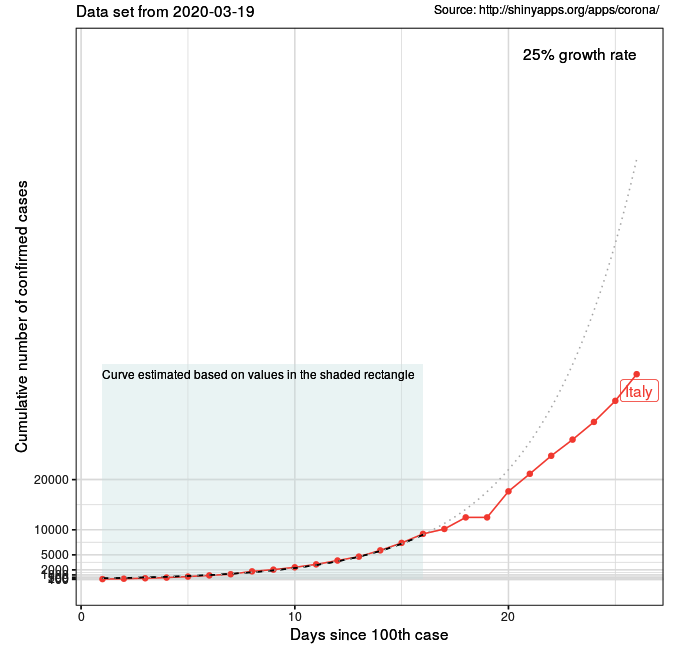
The “flattening the curve” is more apparent when one compares the province of Lodi (restrictions on movement since Feb. 23) with Bergamo (March 8):
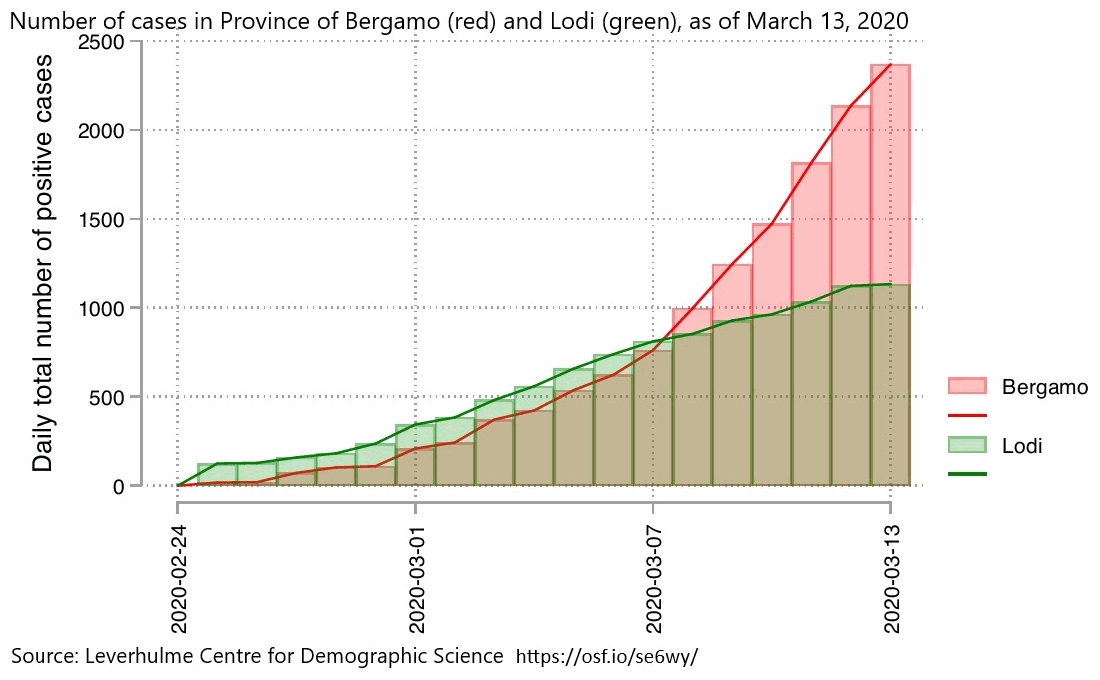
But when a country doesn’t want to learn from other countries’ experiences, hecatomb is what’s going to follow. Germany, for one, while at 15,000 known infections, still ponders whether a national lockdown is necessary, whereas Italy instated it at 9,000. (Well, Germany lost two wars that were of its own making, so what if it loses one more war?)
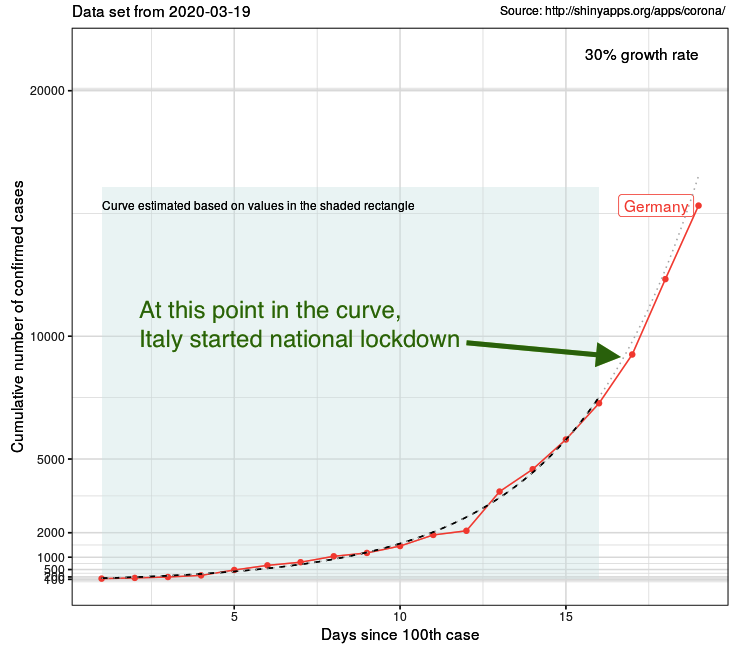
The pandemic is still progressing as forecasted, no matter what the optimists are saying. It’s far from being contained!
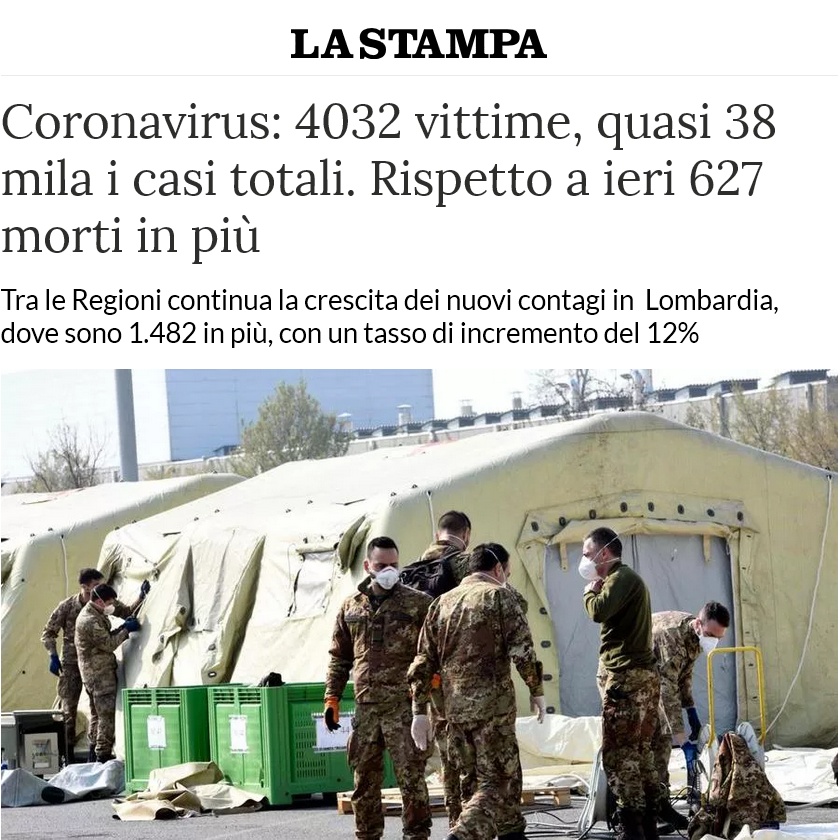
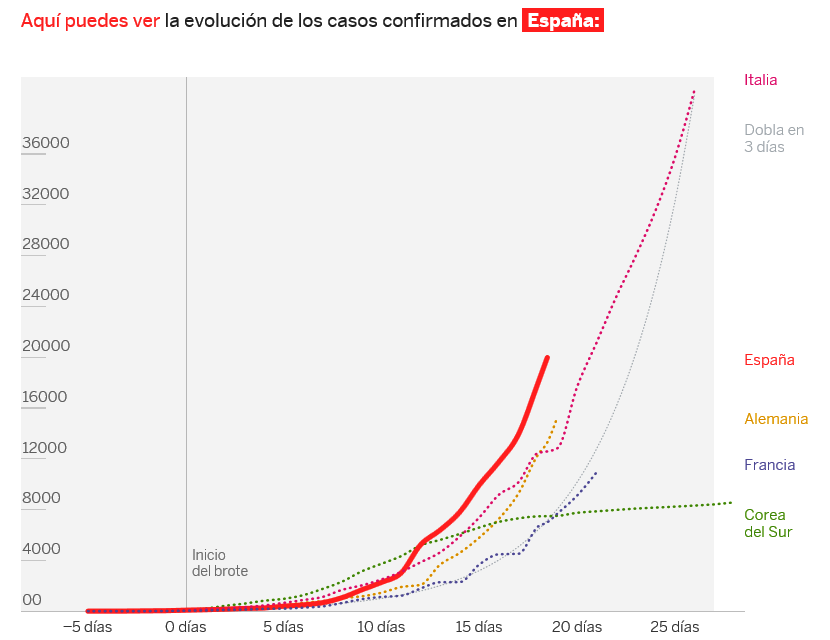
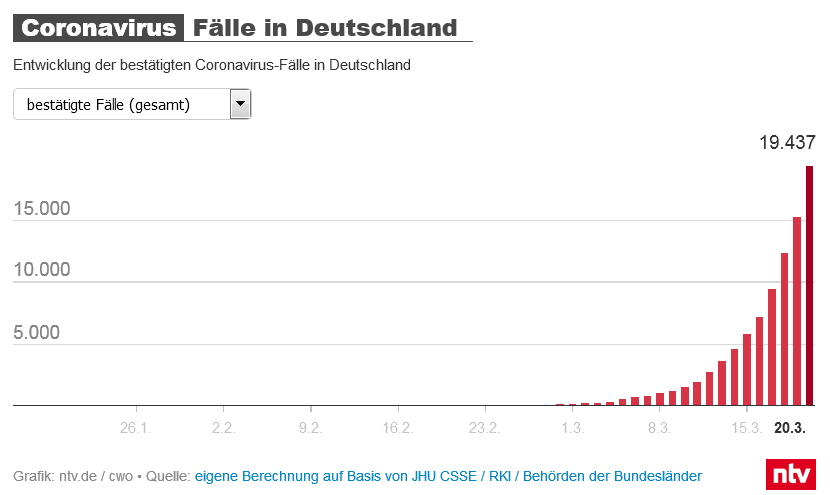
Italy is nonetheless fucked-up. I don’t know whether their tourism will ever recover (which is a shame for such a tremendously beautiful country!), but I know what kind of shortage is going to be noticed soon enough…
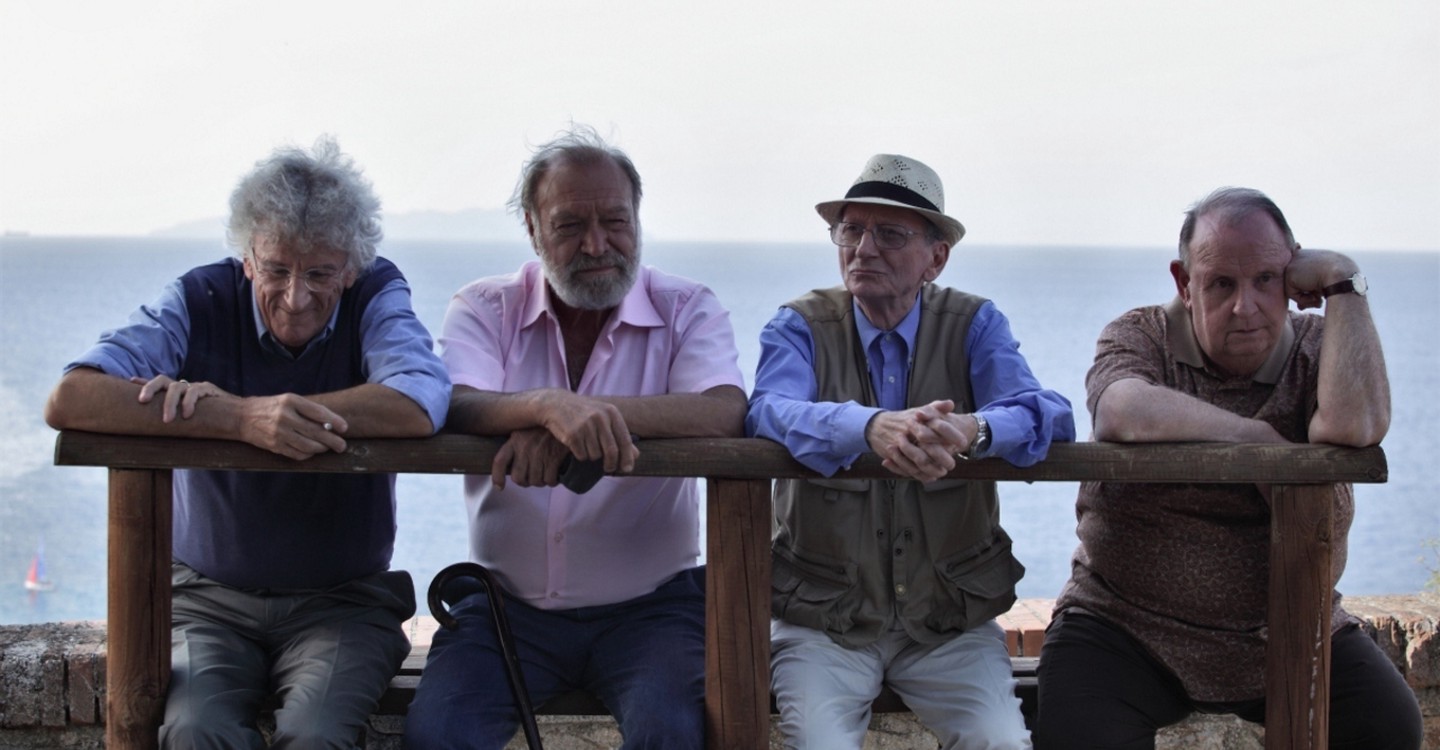
There’s one saying in my home country, and it translates approximately like this: when you don’t know what you’re doing, be well-organized and scrupulous. This is exactly what we could notice in Italy and France with their self-issued lockdown permission forms (attestation de déplacement dérogatoire in France; autodichiarazione / autocertificazione per gli spostamenti in Italy).
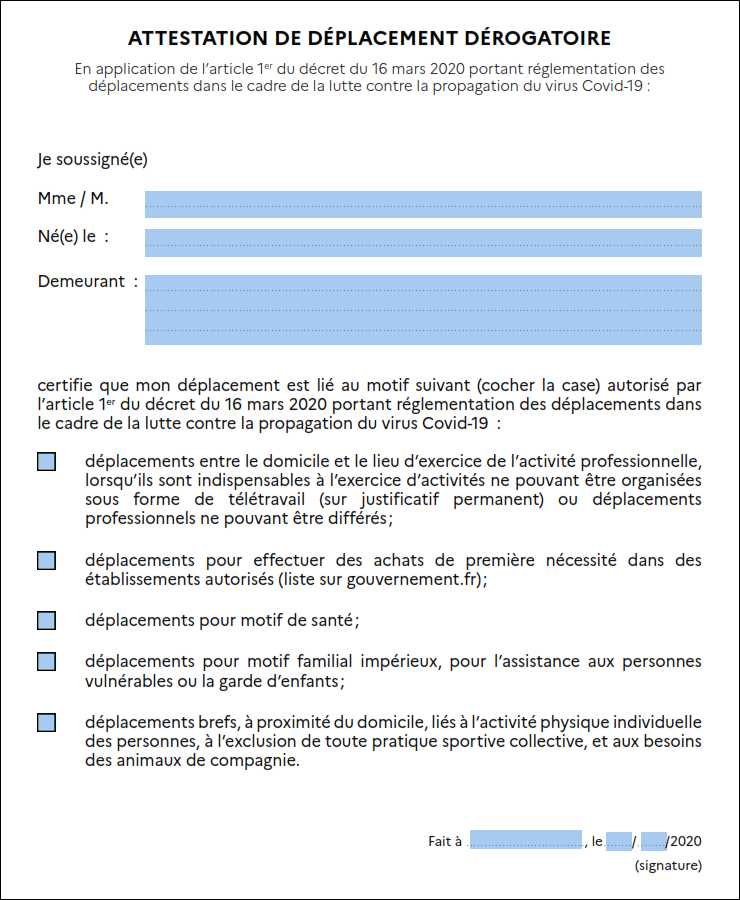
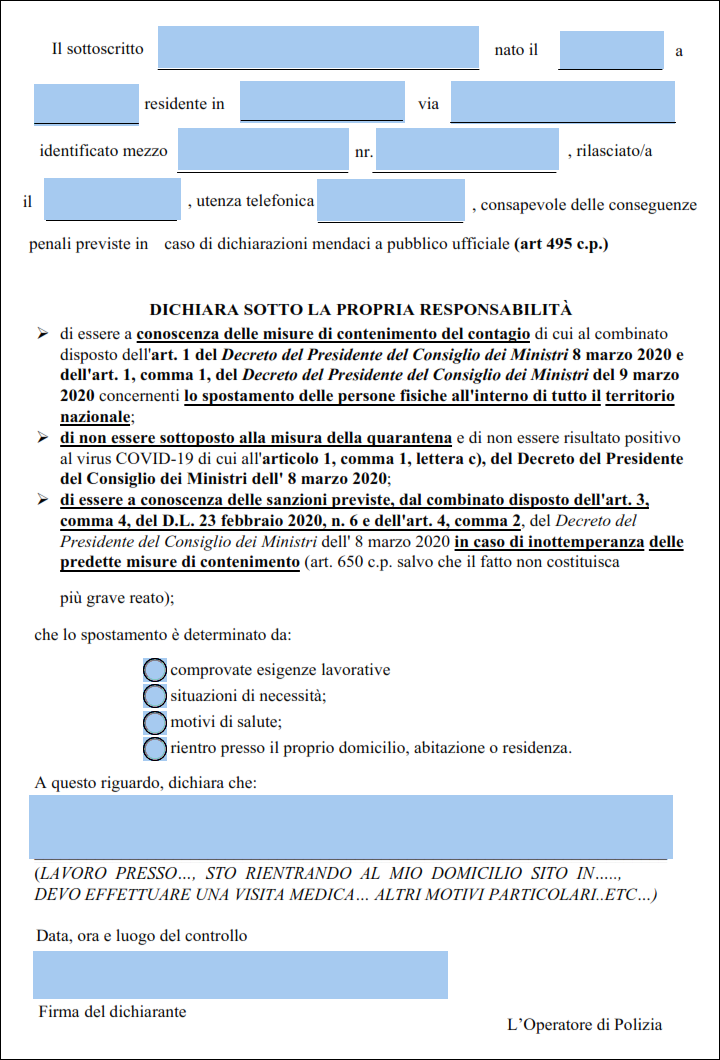
Basically, one has to print (or copy by hand!) such a form and fill it each and every time they go out with a purpose that’s still allowed by the law. Every single time. Bearing the date and time, and signed.
A logical question came right away to my mind: why is there a need for a written document, instead of just a verbal statement made to the police officer or to the carabiniere? It’s a huge and unnecessary complication to print such a document for every exit, and even more so if it has to be written propria manu. Could it be for silly legal reasons? If I’m not wrong, in both legal systems of France and Italy, a false written statement is punished by the Penal Code (possibly by Art. 441-1 or Art. 441-7 in France, and by Art. 495 in Italy, but I am not a lawyer); however, the new decrees that established the restrictions of movement could have added a penalty for making false oral statements in the context of the law, thus simplifying the procedure. When Spain and Belgium imposed similar restrictions, they didn’t “invent” any such stupid self-issued permits!
The fact that two Governments were dumb is maybe less severe than the fact that nobody raised the question in the public space in the respective countries. I tweeted this question once in French and once in Italian, as replies to existing tweets, but nobody bothered to answer or to relay the question. The only question they asked: do we need such a paper each and every time? (The answer is yes.)

Many Italians cry “fascism!”, and this might explain the significant opposition to the imposed restrictions. Here’s a 10-tweet thread from the only so many:
And it comes from an intellectual! From the complaints I see, I’d mostly agree with the fourth one:
Epidemiologists said it more than once, and not only for Italy: “close everything down for two weeks!” (at the beginning); now they say: “close everything down for 4 top 10 weeks!” That Italy is in “national quarantine” for four weeks and the situation is still deteriorating is only the proof that more severe restriction should be imposed–and enforced!
There is a risk to that, I agree. The “human rights dimension” seems exaggerated under the circumstances, but the strict quarantine imposed in Wuhan had shocking flaws:
A boy with cerebral palsy died because no one took care of him after his father was taken to be quarantined. A woman with leukemia died after being turned away by several hospitals because of concerns about cross-infection. A mother desperately pleaded to the police to let her daughter with leukemia through a checkpoint at a bridge to get chemotherapy. A man with kidney disease jumped to his death from his apartment balcony after he couldn’t get access to health facilities for dialysis.
Well, why don’t we learn from this and just do it better? Laxity is not part of the solution. (Whoever is willing to try to understand through an automated translator two testimonials written in Romanian from China should look here, then here.)
The West refused to learn from the Chinese experience. Here you have two resources in English, as PDFs: The Coronavirus Prevention Handbook (Hubei 2020); and Handbook of COVID-19 Prevention and Treatment (First Affiliated Hospital, Zhejiang University, 2020).
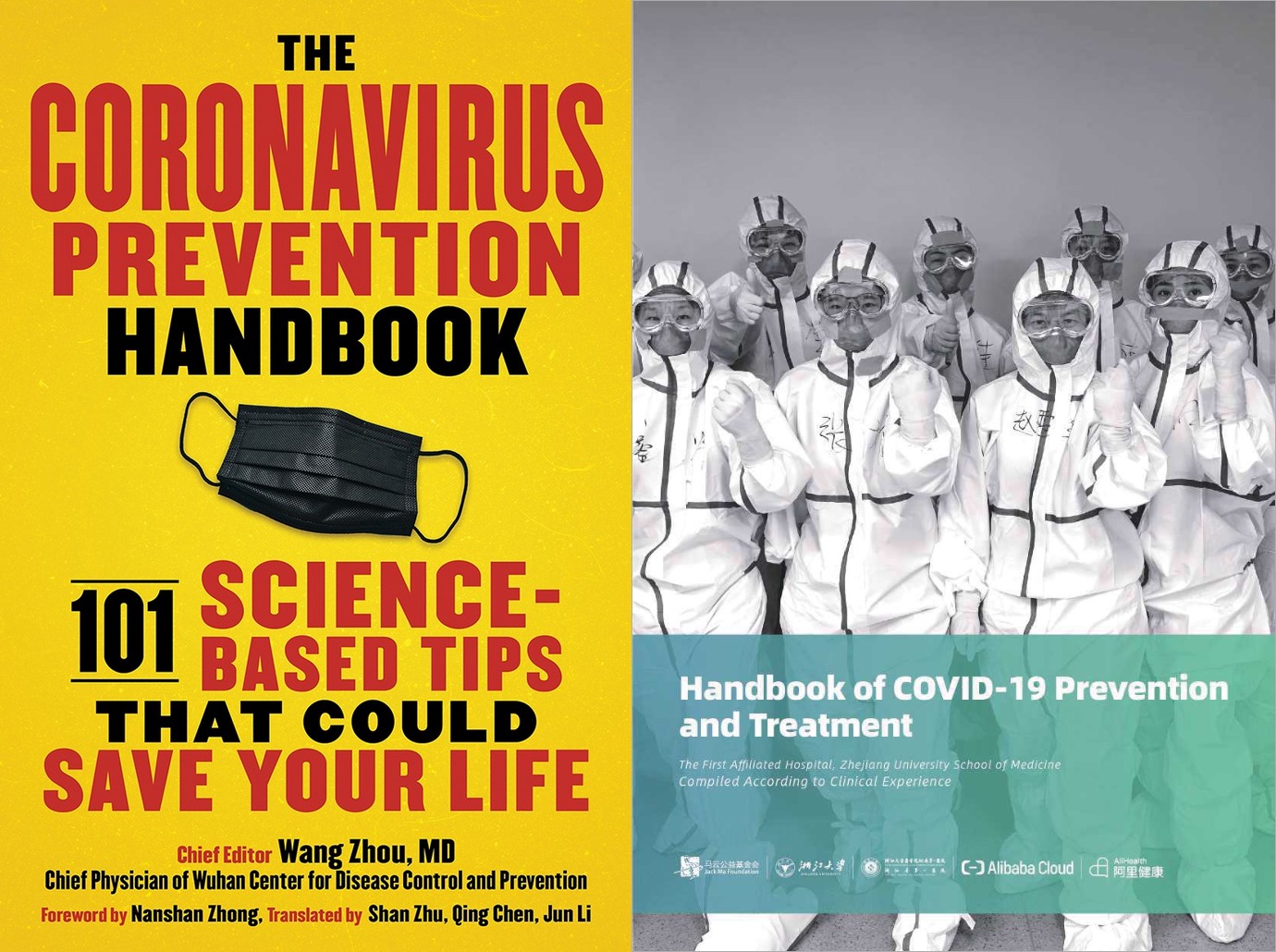
Let’s get back to what Governments should impose and enforce, ensure and provide, manage and organize:
- Not a single non-essential business should remain open. Screw the profits, lives matter more. (When Ford, Fiat, or Tesla are manufacturing medical ventilators–as they said they intend to do–, the involved units are obviously essential.)
- Full lockdown. Nobody on the streets without just cause.
- No checkout clerk should work without a mask, which should be provided through the care of the (local) government. The same for every other jobs that involve similar or greater risks.
- Where appropriate, a wartime economy mode should be put in place, as long as there are still some factories in Europe (not everything is made in Asia). That means reconversions, temporary requisitions, the whole shebang. We are at war with coronavirus:
People whose jobs have vanished from beneath their feet need money to live on but soon they’ll also need a purpose, something to do for months on end. We will have a vast reservoir of bored, frustrated, depressed citizens whose jobs weren’t essential to survival on one hand, and on the other, a shortage of people to do essential work from social care to food production as others go down sick. Ministers should be thinking now about how to match them up, in ways that don’t spread infection – if those who have had it do turn out to be immune, should they be trained or organised to fill the sinkholes that will open up in society?
During the second world war, factories were turned over to essential war supplies from munitions to uniform fabric, and women or men who weren’t medically fit to fight were drafted into everything from working on the land to fighting fires. We might need a similar voluntary effort now, except that it will also have to plug the very different gaps a flu epidemic opens up: more delivery drivers if older people can’t go out shopping, or resources for home education.
- Compensations shouldn’t be paid to businesses, but to their employees who are forced to be put in economic unemployment, Kurzarbeit, sick leave or whatever it is. $1,000 helicopter money, as suggested for the US by Nouriel Roubini, is a stupid thing. People need a constant income for the following months, more like 75-85% of their normal salary.
- Self-employed people, freelancers, and generally those working in the “gig economy” should be provided with 70-75% of their usual income if they’re out of business due to the pandemic.
- Unemployment benefits should be extended in time beyond what’s currently stipulated in the laws. (Belgium decided to pay €1,450 the newly unemployed who never used the system.)
- Companies should be forbidden to lay off for the next six months (not just 60 days, as it’s the case in Italy). If they’re provided with support through government spending (Keynes) and they still can’t cope, special bankruptcy procedures should be enacted, with the possibility of nationalization.
- Additional mechanisms should be found for small companies, which will be the most affected by the crisis.
- Even more solutions must be found for tourism, travel, catering and connected industries.
- Some countries have decided to suspend the installment payments for 2-3 months; I hope this means that the loans, debts, etc. have the respective contracts automatically extended in duration. Payments of taxes and local taxes have been suspended for 3 months. Fewer countries have also decided to suspend the payments of the utilities for those who can’t work–I’m not sure this is such a good idea. How about those who can’t pay the rent? Could the Government cover 25% of the rent and, considering that renting is a business that should share with everyone else the general loss of business, could it also force the landlords to temporarily decrease the rents by another 25%?
- Evictions should also be suspended for at least three months.
- Prices of most commodities should be frozen, or only be allowed a small increase.

- Stock exchanges should be closed for at least 60 days. The purpose of a stock exchange is to pretend it’s used to capitalize companies, then to generate fake value out of nothing, and finally to generate crashes when anything goes wrong. In the long run, this must change. Maybe after this COVID-19 pandemic we manage to fucking dismantle the stock exchanges as they’re now and make stock really an investment tool, not something that’s 99.99% pure speculation, oftentimes automated (see HFT).
- Forex trading cannot be halted for the time being, but–also in the long run–a substituting mechanism must be found. After all, under the Bretton Woods system, the banking and monetary crisis were remarkably rare.

And now, how reality proved me right, although for years I’ve been considered a “luddite” for preaching such a thing.

On March 18, a question arose in Europe: will the Internet backbone able to withstand the COVID-19 crisis in the context of millions of people working from home? I then tweeted:
The next day, the European Commission asked Netflix to bridle (cripple) their streaming, so that more bandwidth be available to the more important traffic. Netflix reluctantly agreed. One day later, YouTube saw the same request from the European Commission; Google too promised to lower the traffic with 25% by disabling FullHD (as I’m writing this, 1080p is still available; maybe they only disabled higher resolutions and 60fps).
What’s the catch?
Simply put, with analogue terrestrial radio and TV–you know, the old style, before the cable TV went digital–it didn’t matter there was one listener or fifty million. Hertzian waves couldn’t care less (hey, it’s magic!). But with digital TV, Internet radio, YouTube, Deezer, Spotify, Netflix and the similar streaming services, there’s one huge problem: if 1 million devices are using any such service, the required bandwidth is 1 million times the bandwidth required for a single device! (The load is not rigorously exact for the backbone, as some caching servers might exist in several countries for some such services, e.g. for YouTube; the overall assessment remains right.)
Streaming doesn’t scale up well. Digital doesn’t scale up. And people are abusing the technology:
- They’re streaming at 2160p or 1080p at 60fps even when the screens they’re using don’t really make use of the respective quality, and 720p would suffice (classic TV had 576p at 25fps).
- They’re streaming from Spotify or Deezer instead of using locally saved MP3 files. Every single time a song is listened, it generates traffic.
- They’re streaming at 320 kbps, when AAC+ 64kpbs is as good as MP3 96-128 kpbs, and most people wouldn’t notice the difference.
- They’re using YouTube to listen to music, without caring or realizing that even if one doesn’t care about the image (which might be a static picture, but it’s still a movie!), it takes bandwidth.
- Many radio stations (e.g. all the major radio stations in France) are “quasi-TV” in the meaning that they’re streaming video (usually on YouTube) live from their studios.
But the millennials (Generation Y) and Generation Z strongly believe they need 4K and 8K video; they actually don’t watch TV and they don’t listen to the radio–they’re streaming.
They’re also extremely vocal when it comes to Net Neutrality; now it’s time they realize that during a crisis, the opposite of a net neutrality is needed, and their whims should be ignored.

One more funny thing that happened these days: people deserted the public transportation, the shared scooter companies closed their services, and those owning a car suddenly felt happier than ever.
Idiots still exist, from the Church of Greta Thunberg® and Elon Musk:
Why, of course. In a super-crisis, when the power grid is down (Greta forbid!), one could use the stocked current (in buckets, right?), as opposed to the jerrycans of gas anyone can stockpile!
Not that the automotive industry learned anything: right in the middle of the apocalypse, Audi announced they’ll launch about 20 new and facelifted models in 2020, of which 5 fully electric and 12 hybrid!
Most automakers decided to temporarily shutdown most of their factories. The outcome of the sanitary crisis is not predictable, but with so many jobs at risk, people won’t ve willing to purchase expensive cars. Anyone who purchased a €12k car that’s still in good shape will stick to it rather than spending €30k+ on a car “Certified by Greta Thunberg®”! (Also, Europe should stick its plan of halving the CO2 emissions by 2030 in her ass! Right now many if not most people are at home, but this should change once it’s all over.)
Simpler is better than better.

The 1918 Spanish flu took somewhere between 17 and 50 million lives, if not more; the 1957 “Asian flu” is said (by the WHO) to have taken 2 million lives; the 1968-1969 How Hong Kong flu struck unexpectedly and claimed over a million lives worldwide–the same virus returned in late 1969 and early 1970, and one Italian in four fell ill to bed.
Should you be experiencing cabin fever while waiting for the worst, what could you do? I suppose you already watched 28 Days Later and 28 Weeks Later. But this kind of contamination is not everything there is. Maybe the original The Day of the Triffids is funnier.
Books are even better. IMO, one book that would be a better match for the way you feel might be Mordecai Roshwald’s Level 7, translated in some languages as Ultimatum.

An even better atmosphere of “waiting for the inevitable to happen” can be found in Ben H. Winters’ trilogy The Last Policeman.
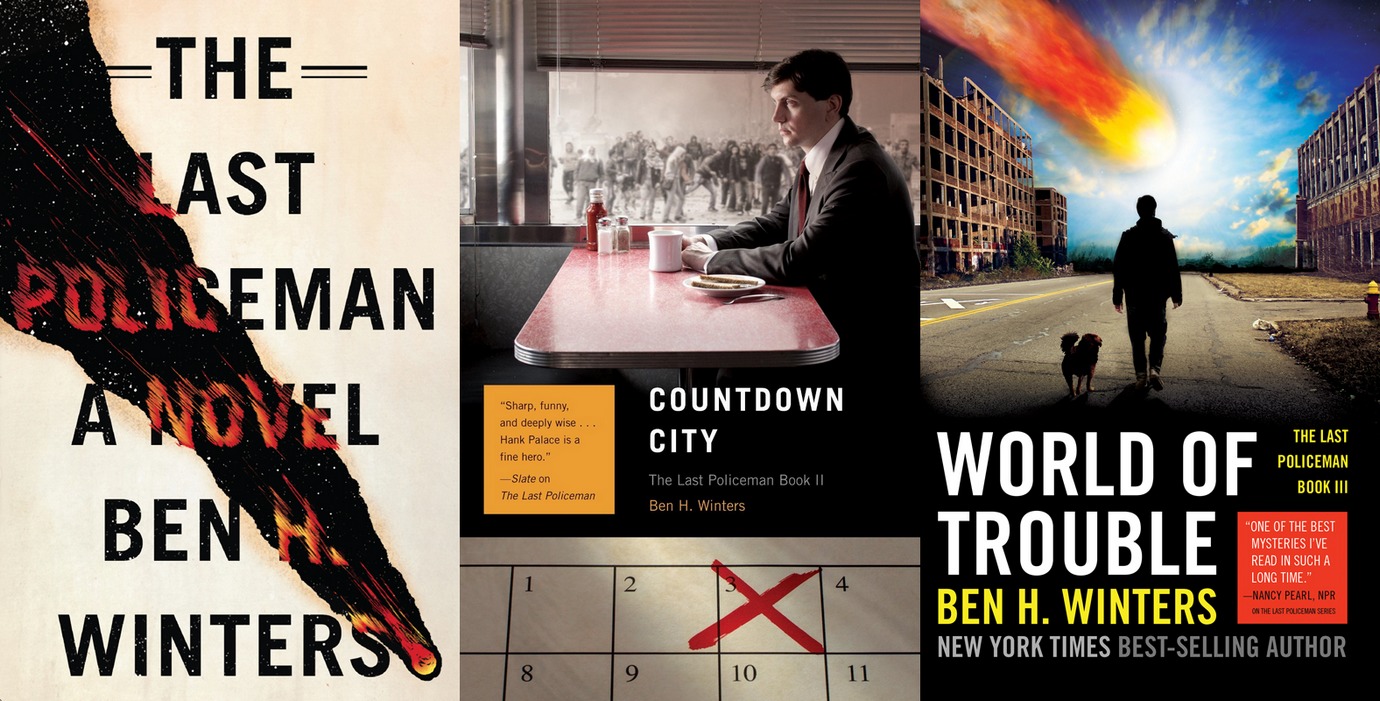
But if I were you, I’d rather read some romanzi gialli (not thrillers) and watch some beautiful movies–stress on beautiful.
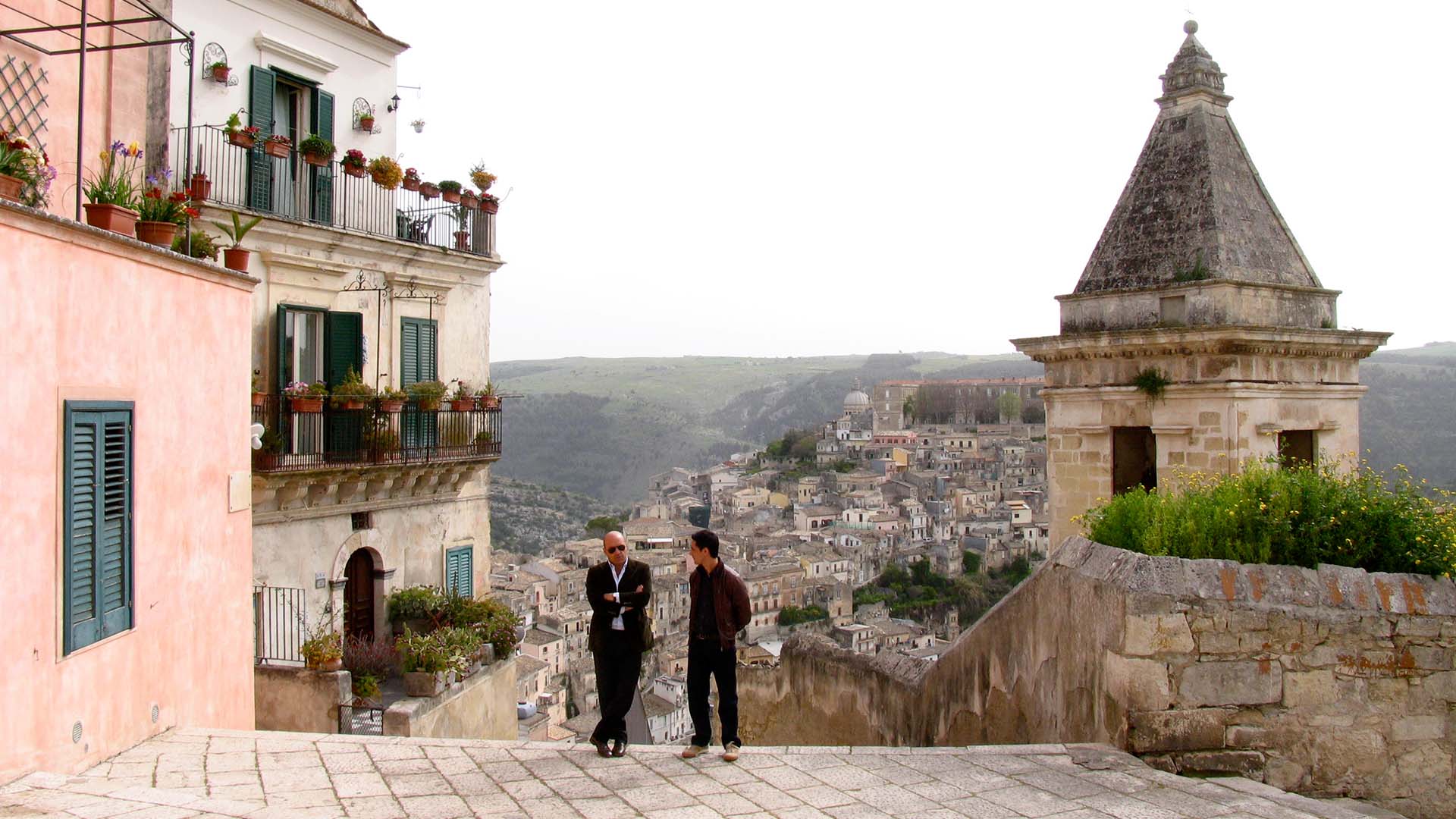
Unless you prefer the comic books, les bandes dessinées, i fumetti.

See you from beyond!

Epidemiologists said it more than once, and not only for Italy: “close everything down for two weeks!”
Cum era inceputul fiecarui film apocaliptic – un om de stiinta care zice adevarul dar nu e luat in serios decat prea tarziu…
Ministers should be thinking. Aici m-a bufnit rasul.
Level 7 am citit-o acum +30 ani, fictiune. Acum pare c-o traiesc.
Those Romance cultures have a cult of the written paper; Romania too introduced a self-certification to use during the night curfew (22-6):
It’s obviously too verbose in the description of the first legitimate reason to break the curfew (just like the French one). I can’t imagine those who don’t have a printer (probably 90% of the population) writing by hand all that garbage.
Politicians are the most retarded representation of the Homo sapiens sapiens species.
Si din pacate ei ne conduc.
I forgot to add the “enhanced” Italian autodichiarazione, another proof of political idiocy:
Meanwhile, Romania has extended to 24/24 the curfew requiring the self-certification.